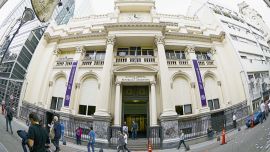Argentina’s Supreme Court has upheld the corruption conviction handed down three years ago to former president Cristina Fernández de Kirchner, confirming a six-year prison sentence and a lifetime ban from holding public office.
In an explosive ruling eliminating Fernández de Kirchner from the political scene in a crunch electoral year, the nation’s three Supreme Court justices ruled that the graft conviction handed down in the so-called ‘Vialidad’ trial, probing irregularities in the awarding of 51 highway contracts, should stand.
In a unanimous decision, Justices Horacio Rosatti, Carlos Rosenkrantz and Ricardo Lorenzetti issued a joint opinion rejecting each of the defence’s arguments challenging Fernández de Kirchner’s conviction.
They wrote that due process had been carried out and that “the defendant obtained a sentence based on law.”
The decision to impose a permanent disqualification from holding public office on the ex-president was upheld.
The Supreme Court also upheld the acquittal for the crime of unlawful association, dismissing the Public Prosecutor's appeal as “inadmissible” under Article 280 of the Civil and Commercial Procedural Code.
Fernández de Kirchner’s defence team had raised numerous objections, questioning the impartiality of the court and its assessment of the evidence. The justices, however, rejected those arguments, describing them as a “rehashing” of previous arguments.
“The rulings issued by the lower courts were based on extensive evidence – assessed in accordance with the rules of sound judgement (Article 398 of the National Criminal Procedure Code) – and the Penal Code enacted by Congress,” the justices wrote.
“It has not been demonstrated that the challenged ruling fails to constitute a reasoned application of current law to the specific facts of the case, nor that any constitutional guarantee was violated during the proceedings. Due process was upheld and the appellant received a judgement based on law,” they continued.
“The penalties imposed are those determined by the current legal framework. The prison sentence and disqualification only serve to protect our republican and democratic system under the criminal laws enacted by the people's representatives in Congress (Article 174, final paragraph, Penal Code, as amended by Law 25.602),” the justices added.
Last weekend Fernández de Kirchner announced that she would run for a seat in the Buenos Aires Province legislative elections on September 7.
Winning election would have secured the veteran Peronist leader immunity for the duration of her four-year term, but the court’s decision means she is now unable to run.
Fernández de Kirchner is the most influential opposition leader in Argentina and has regularly voiced criticism of President Javier Milei’s government. She proclaims her innocence and says she is a victim of political and judicial persecution.
President Milei took to social media to cheer the verdict. “The Republic is functioning and all the corrupt journalists, accomplices of lying politicians, have been exposed in their operettas about the supposed pact of impunity," he wrote on his X account, without directly mentioning the former president.
Conviction
Fernández de Kirchner was convicted in December, 2022 on corruption charges and that decision was confirmed in the second instance by a higher court last year. She then appealed that verdict to the Supreme Court.
She was handed a six-year prison term and a lifetime ban from holding public office for the crime of "fraudulent administration" in the awarding of roadworks contracts during her time as president.
The 72-year-old opposition leader, who led Argentina from 2007 to 2015 as head of state, fiercely denies the accusations against her.
Federal Oral Tribunal No. 2 issued the original verdict, which was later upheld by the Federal Chamber of Cassation. Fernández de Kirchner appealed the conviction before the Supreme Court on March 31.
Prior to reviewing the case, the nation’s highest tribunal requested the opinion of Attorney-General Eduardo Casal, who is both the nation's chief public prosecutor and the prosecutor before the Supreme Court.
In a 13-page submission, he called for the former president’s sentence to be doubled from six to 12 years. Casal also urged the Court to overturn Fernández de Kirchner’s earlier acquittal on the charge of “unlawful association” and to convict her of this offence as well.
The ‘Vialidad’ case centres on the presumed favouring of allied Kirchnerite businessman Lázaro Báez in the awarding of public works projects.
Báez’s companies were awarded around 80 percent of national public works contracts in Santa Cruz Province during governments led by late former president Néstor Kirchner and Fernández de Kirchner, his wife and widow.
Former public works secretary José López, former head of the National Roads Directorate Nelson Periotti, and five former Santa Cruz Province officials were sentenced to prison terms ranging from three to six years in the trial.
Former federal planning minister Julio De Vido, former officials Abel Fatala and Carlos Kirchner – a cousin of Néstor Kirchner – and former Santa Cruz Province official Héctor Garro were acquitted.
“We are certain that, through 51 public tenders for the construction of national and provincial roads in Santa Cruz between 2003 and 2015, an extraordinary fraudulent scheme took place, harming the financial interests of the national public administration under the terms established by criminal law,” the judges wrote in their initial ruling.
Reaction
Labour leaders and unions indicated this week they may stage a national strike in response to a negative Supreme Court ruling.
The CGT umbrella union grouping, Argentina's largest labour federation, issued a statement on Tuesday asserting that “democracy is in danger.”
Describing the legal procedures against the ex-president as “political persecution and proscription,” they warned that any attempt to interfere with the upcoming electoral process would “call into question democratic rules.”
Citing “irregularities” in the case against Fernández de Kirchner, the CGT compared the corruption allegations to those against former Brazil president Luiz Inácio Lula da Silva earlier in the decade.
The CGT called for the “will of the people” to be “protected” through “free elections” staged “without interference from other powers.”
Former Peronist presidential candidate Sergio Massa said in a post on social media that the case had been "riddled with irregularities” and said it was essential the ex-president's appeal be upheld.
Kirchnerite loyalist Oscar Parrilli said earlier on Tuesday that Fernández de Kichner had been subjected to an “‘unprecedented, tremendous and cruel persecution.”
The objective, the Unión por la Patria senator said, is to “take Cristina out of the game,” in order to “make it easier for the government to carry out this cruel and terrible plan against the Argentine economy, against natural resources, against gas, against Argentine oil, against mining.”
Earlier in the day, Fernández de Kirchner met with Peronist senators to discuss her situation and the party’s response.
Soon after, it emerged that Rosatti had called the court’s members to a meeting at 4pm to define the resolution of the case.
In May, Argentina’s Senate rejected a proposed "Ficha Limpia" (“Clean Slate”) bill that sought to bar candidates with corruption convictions from standing for office. The rules would have affected Fernández de Kirchner's candidacy.
– TIMES/NA/PERFIL


























Comments